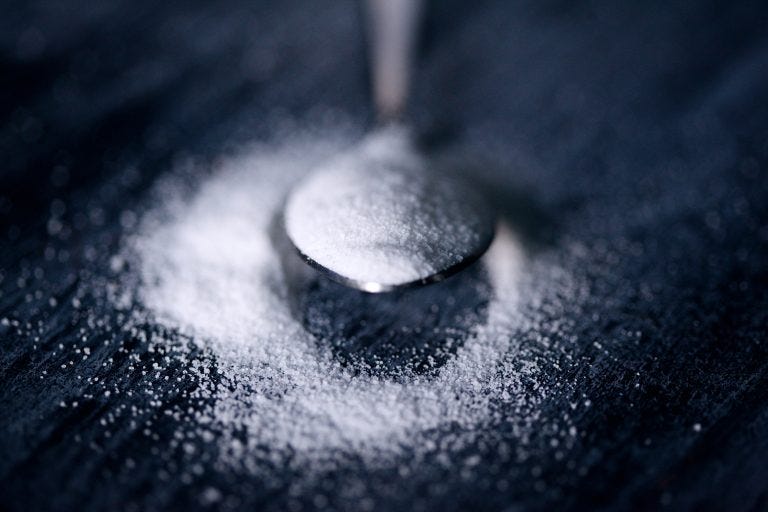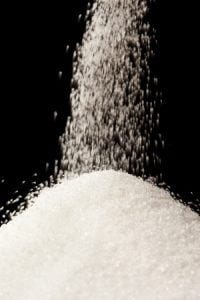Nobody knows more about the artificial sweeteners than I do, and that means I know a lot about sugar, too. In my world, people don’t seem as cautious about using the toxic chemical sweeteners as they are about using sugar.
Are you afraid of sugar? Don’t be surprised to hear me say that real sugar is healthier for you than the artificial sweeteners.
Over the past several decades, sugar has become a villain in the modern American diet. It’s understandable if you’re diabetic, but even then, the artificial sugars aren’t the solution to better health. It’s not the sugar - it’s how it is used - or over-used, should I say.
Sugar is the original sweetener - it has been safely used for - um - a million years or so. All animals eat sugary foods, or better put, all animals eat foods naturally sweetened with “natural“ sugar.
My grandparents ate sugar. Their parents ate sugar. The birds and the bees eat sugar. So, where did we go wrong?
We went wrong when we started refining sugar to preserve it on sailing ships across the open seas. We went wrong when we started adding refined sugar to processed foods. We went wrong when we started a love affair with bottled soft drinks.
Humans started over-using sugar when manufacturers discovered how to “refine“ sugar for extended shelf-life;
Food manufacturers discovered that sugar added to pre-packaged foods sells more products (especially in cereals, gum, drinks, and ice cream);
Fake sugars took advantage of the market when the over-use of refined sugars started making people fat and sick.
Sugarphobia
If you are confused about what to use, give me a call and we’ll make this confusing issue simple. I love doing tele-consultations. Everybody needs someone to talk to. Especially when you’re being marketed the wrong thing.
This modern “fear of sugar“ has led to a sugarphobia, which can lead to a dependency on chemical sweetener substitutes, which then creates a craving for “simple carbs”, and that results in “over-eating“ the wrong kinds of foods, and (one more ....) which leads to weight gain and obesity. Whew, that’s a mouthful (sorry for the pun.)
Sugar is blamed for causing many health problems including heart disease, diabetes, anxiety, fatigue, depression, hyperactivity, and even criminal behavior.
But is this accurate information? Are we blaming the “right“ form of sugar for our health problems? Has mis-information created a fear of sugar? Are you throughly confused by the advertisers?
Don’t worry - I’m not advocating eating refined processed, “white“ sugar. The key is to eat normal and moderate quantities of UNPROCESSED and RAW sugar.
This prevents an even more dangerous issue - turning to the artificial sweeteners as a solution! But of course, that’s what the marketers want you to do - forever.
The FDA
Most people think the artificial sweeteners are safe to use because they have been approved by the FDA. We once used to respect FDA decisions, but I think we’re figuring out that today’s government watchdog agencies are more loyal to their donors than to doing what’s always right.
Back in the day, we could trust some within the FDA. A 2004 FDA Report from the Sugars Task Force stated that, added sugar at current levels is not detrimental to health.
They stated, “when normal or moderate quantities (of sugar) are consumed, sugar cannot be linked to any disease, nor does it create a dependency.“
The jewel in this statement is: “normal or moderate quantities.”
According to Consumer’s Research Magazine: “Refined sugars and chemical sugar substitutes benefit the corporations manufacturing and marketing them, but do not benefit the consumers.“
They wrote in a 2005 article: “Are such foods truly beneficial and desirable? Diabetics, weight watchers, and the general public might make better food choices by selecting basic, rather than highly processed foods; for example, apples rather than turnovers; or plain dairy foods rather than sweetened.”
By 1990, Americans were consuming an average of 20 pounds of artificial sweeteners. Yet interestingly, as the consumption of sugar-substitutes continued to rise, so too, did the consumption of refined sugar.
Who’s To Blame
Ever since the diet sweeteners blitzed the market and sugar-free became a fad, the sugar industry has been in defense mode.
The diet sweetener manufactures claim sugar causes weight gain, and the sugar industry knows that the diet sweeteners cause weight gain. As people get fatter and at younger ages, what’s really at the core of weight gain? As of September 2024, 40.3% of adults in the U.S. are considered obese, which translates to over 100 million American adults are living with obesity.
“Sugar, averaging 15 calories per teaspoon,” states Andy Briscoe of the National Sugar Association, “is blamed for America’s obesity epidemic, a perception perpetuated by the artificial sweetener market.”
What do the artificial sweetener manufacturers say about this?
“A moderate coffee drinker who chooses sugar, consumes an additional 20,000 calories a year, and a heavy coffee drinker adds 80,000,” says Lael Edelstein, Manager of Nutrition Communication for Chicago’s Merisant Corp., manufacturers of Equal®.
So the debate continues, and no one wants to blame the consumer for over-consumption and poor choices.
Obviously, I recommend ditching the diet fizz and returning to natural forms of sugar, even if you are a diabetic. There are many other things that you can do to lose weight, such as regular exercise and eating a whole foods diet, but we can get into this in another post. For now, let’s stick with which kind of sweetener is better for you to use.
The Best Sweeteners To Choose
* Stevia*
* Raw, unprocessed sugar (Sucanat®)
* Brown Rice Syrup
* Barley Malt
* Date Sugar
* Honey
* Maple Syrup
* Molasses
* Sorghum
* Agave Nectar
*Safe for diabetics. Stevia is similar to saccharin - use it sparingly or it is bitter - otherwise, it’s “naturally“ delicious and a much healthier choice!
Secondary Natural Sweetener Choices (Use With Discretion)
* Fructose
* Fruit Juice Concentrate
* Juice Concentrate
* Sugar alcohols (Polyols)
* Isomalt
* Lactitol
* Malitol
* Mannitol
* Sorbitol
* Xylitol
* Turbinado® Sugar
* Tagatose
Please visit my website for more information on these sweetener choices and ways to lose weight and get healthy again without giving up your sweet tooth.
Remember to make the right choices! Your great grandparents did.
_______________
If you want to learn more about healthy living and disease prevention, contact me at janethull.com. Remember that you are never alone when you are looking for good health!
I look forward to supporting you on your journey to alternative health and wellness.
_____________
Disclaimer: This article is for informational purposes only, and is educational in nature. The FDA may not have evaluated some of the statements. This article is not intended to diagnose, treat, cure, or prevent any disease. Please discuss with your own, qualified health care provider before adding supplements or making any changes to your dietary program.
Before taking vitamins, consult your doctor; pre-existing medical conditions or medications you are taking can affect how your body responds to multivitamins.
You have our permission to reprint this article if you attribute us with a live back-link to this article and the youtube links.
http://www.janethull.com/




